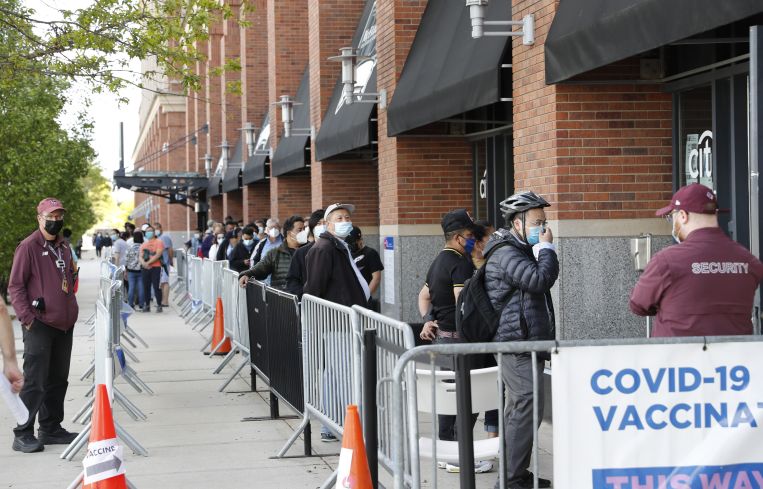The Post-Labor Day Return to Office Falls Apart
Mandate all you want
By Tom Acitelli July 29, 2021 10:26 am
reprints
Google announced on Wednesday that it was pushing its return-to-office date to late October from after Labor Day on Sept. 6, citing spikes in coronavirus cases. The company, one of New York City’s most voracious office users, joined fellow tech hegemon Apple in pushing back by several weeks a return to what was already going to be a hybrid work model.
“We recognize that many Googlers are seeing spikes in their communities caused by the delta variant and are concerned about returning to the office,” Sundar Pichai, CEO of Google and its parent Alphabet, said in an internal message that The New York Times first reported. “This extension will allow us time to ramp back into work while providing flexibility for those who need it.”
The move comes as companies smaller and larger, in a myriad of different industries, grapple with what to do with what seemed like a hard return-to-office deadline of Labor Day, the traditional end of summer. It now looks like that deadline was about as sturdy as after Labor Day in 2020 or after New Year’s in 2021.
Back then, of course, vaccines were either nonexistent or not at all widely available. They’re now everywhere, with governments at all levels and private companies and organizations trying to incentivize the unvaccinated to do their civic duty. Short of that, the mandates are coming fast and furious.
In New York, that includes edicts for state and city workers: Get vaccinated or get tested regularly. President Joe Biden is expected to hand down a similar mandate for federal workers any hour now as of Thursday. Private companies, too, are doing the same, sometimes with none-too-subtle warnings about noncompliance.
“I would call it directionally very strong without dictating … yet,” Morgan Stanley Chairman and CEO James Gorman said earlier this summer, about his own company’s request that employees get vaccinated and get back in their offices. “But, Labor Day, I will be very disappointed if people haven’t found their way into the office. And, then, we’ll have a different kind of conversation.”
The Durst Organization, one of New York City’s largest real estate owners, is being, perhaps, the most direct so far: “For our corporate employees, unless they receive a medical or religious accommodation, if they are not vaccinated by Sept. 6, they will be separated from the company,” a Durst spokesman told Crain’s New York Business.
Such requirements are perfectly legal, provided that employers comply with certain accommodation provisions in such laws as the Americans With Disabilities Act, including those health and religious exemptions. It’s also legal for employers to incentivize employees to act in a certain way.
The whole thing now smacks of resignation, though, if not desperation. Nothing drove that home more than Gov. Andrew Cuomo, who all but pleaded for workers to return to the office during his Wednesday vaccination mandate announcement. Think of the wider implications of that not happening, he told companies at a virtual Association for a Better New York event.
“Say to your workforce, ‘By Labor Day, everyone is back to the office,’” Cuomo said. “We need that volume to support the restaurants, the shops, the services.”
New York Mayor Bill de Blasio made a similar plea a couple of days earlier.
“Each private-sector employer needs to do what they believe is right, but I would strongly urge a vaccination mandate whenever possible, or as close to it as possible, at minimum requiring all your employees to get vaccinated or to do weekly testing,” de Blasio said.
Five weeks out from Labor Day, though, only an estimated one-quarter of office space in the New York area is even being used, according to a Kastle Systems analysis published by the New York City comptroller’s office. There are similarly low shares across the country. In the D.C., San Francisco, San Jose, Calif., and Los Angeles areas, office use all stood at or below 30 percent as of July 14.
None of this, too, even gets at the fact that many of these same companies are not planning to return to the office at full capacity — after Labor Day or whenever. Take JPMorgan Chase, one of the most muscular major companies in terms of mandating that workers return (its offices have been open on a rotational, limited basis for much of July). At the same time, though, the nation’s largest bank by assets is transitioning to a more hybrid work model more dependent on digital tools and unassigned seating.
“As a result, for every 100 employees, we may need seats for only 60 on average,” JPMorgan Chairman and CEO Jamie Dimon told shareholders in April. “This will significantly reduce our need for real estate.”
Indeed. See you in September. Maybe.
Tom Acitelli can be reached at tacitelli@commercialobserver.com.



